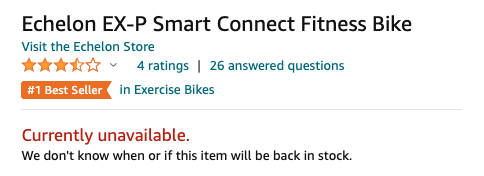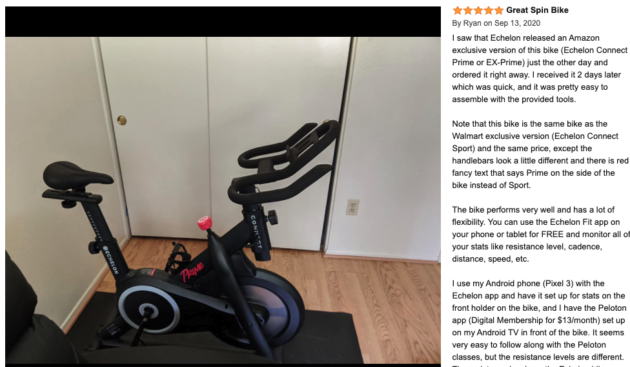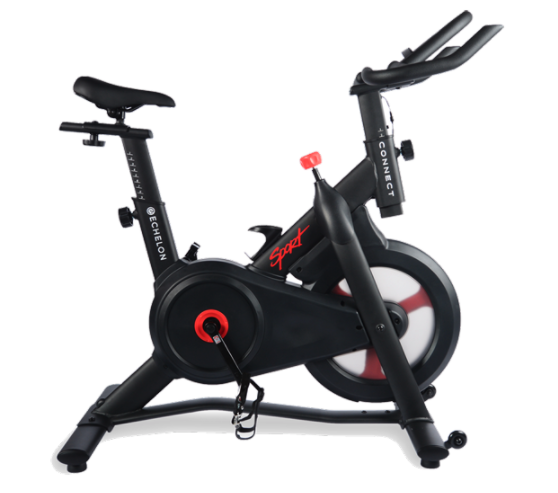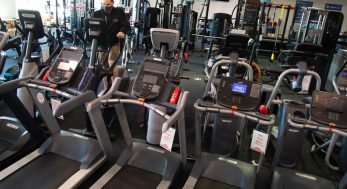
Update, Tuesday, 7:30 p.m. PT: A stationary bicycle made by the exercise gear company Echelon and sold on Amazon as an exclusive “Prime Bike” has been pulled by the tech giant after a day in which it looked like the company was getting into the connected fitness craze.
“This bike is not an Amazon product or related to Amazon Prime,” an Amazon spokesperson told GeekWire Tuesday evening. “Echelon does not have a formal partnership with Amazon. We are working with Echelon to clarify this in its communications, stop the sale of the product, and change the product branding.”
All mentions of Amazon and the “exclusive” nature of the bike have been removed from the description on the product web page, and the name has been shortened to the Echelon Ex-P instead of Ex-Prime. The product was also marked as “currently unavailable” sometime Tuesday evening and the $499 price was no longer displayed.

Original story:
Is Amazon getting set to rival Peloton? That’s how it looked at first glance when an exercise gear company announced a new “Prime Bike” this week, in partnership with the tech giant, describing it as “Amazon’s first-ever connected fitness product.”
“Amazon to be the latest Peloton challenger,” read the news update from stock research site Seeking Alpha.
But on closer examination, the all-caps AMAZON EXCLUSIVE is mostly just a branding deal and not a serious harbinger of the company making its own exercise equipment.
“Amazon and Echelon have partnered up to bring you this exclusive offer and bike design!” reads the first line on the Amazon web page for the Echelon Ex-Prime, or Prime Bike, selling for $499. (Or at least it was earlier today, but now appears to have sold out except for a higher-priced version from a third-party seller.) The bike is made by connected-exercise gear company Echelon, a low-cost competitor to Peloton.
In a news release Monday, Echelon president and CEO Lou Lentine said, “The Prime Bike was developed in collaboration with Amazon, aiming to create an amazing, connected bike for less than $500.”
Despite the news release, the bike has been around since August, according to product details and customer reviews on Amazon’s website. And the deal with Amazon isn’t all that exclusive.
Echelon is selling a strikingly similar bike through Walmart called the Echelon Connect Sport, also priced at $499. The bike on Walmart has red lettering on the side that says “Sport” — and is also sold by Echelon here. The Amazon version has the same red lettering, but it reads “Prime” on its model. A review posted by an Amazon customer (below) shows the bike and the box it came in. The Amazon bike also reportedly has a different resistance knob and handlebars.


Either way, the price is about $1,400 cheaper than the recently reduced price of Peloton’s core model. And pick-up of the news, by such sites as NBC News Shopping, could be impacting Peloton’s stock. Its shares dropped about 2.3% Tuesday morning in pre-market trading, before finishing the day down less than 1% overall, at $94.39.
Peloton, which has attracted more than 1 million paid subscribers to its connected fitness programs, has been riding a blockbuster year, as more people work out from home during the pandemic because of the closure of gyms and fitness studios. The company posted its first-ever profit earlier this month as revenue nearly tripled. Total revenue is projected to be around $3.5 billion in 2021, roughly double the amount it recorded in 2020, according to The Wall Street Journal.
Even with the slight dip in its stock today, Peleton shares have more than tripled over the past six months.
Echelon’s line of bikes and rowing equipment are designed to compete in the space, but at a lower price. The Prime Bike does not come with any device to allow connectivity to on-demand classes. Users have to supply their own tablet or smartphone to connect to the Echelon app, and the bike purchase comes with a 30-day trial of the Echelon United Membership to access scenic rides and classes led by trainers.
Amazon shares closed up more than 5% on the day, at 3,128.99, leading a Nasdaq rebound. However, its stock was riding not on news of a spin bike but rather on an analyst’s upgrade.

